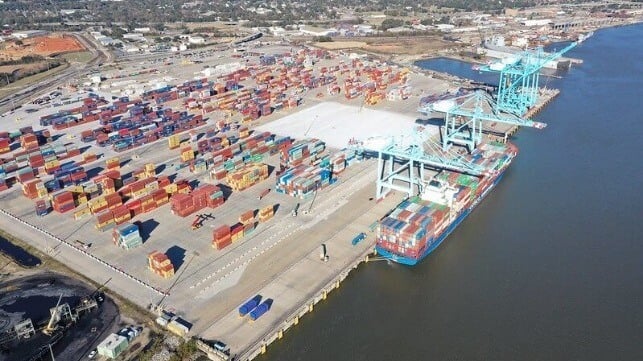ILA Suspends Talks, Warns of “Little Faith” in Reaching Deal On Time

The International Longshoremen’s Association is continuing its tough stance against port automation, announcing today the suspension of contract negotiations due to an issue over automated gates. Noting it is only four months until the master contract expires covering all the U.S. East Coast and Gulf Coast ports, the ILA said in its statement that it has “very little faith that these issues will be addressed in time.” In the past, the union has said it will not go past the September 30 expiration and would strike.
The suspension came just one day before the ILA and the United States Maritime Alliance (USMX) were scheduled to meet for talks regarding the master contract. Talks have been underway since last year for the local contracts with the goal of having completed that phase and now moving into the master contract. The ILA says it will not meet with USMX until the current automation issue is resolved.
The ILA is citing APM Terminals, Maersk’s port company, for the suspension saying the company is utilizing an Auto Gate system, which processes trucks without ILA labor, at the Port of Mobile, Alabama. The ILA says it has heard reports that the system is being used in other ports as well.
In announcing the suspension, they said this is another example of efforts to circumvent the current contract. They are calling the Auto Gate system “a clear violation,” while also accusing APM Terminals and Maersk of “repeated attempts” to circumvent the contract.
“There’s no point trying to negotiate a new agreement with USMX when one of its major companies continues to violate our current agreement with the sole aim of eliminating ILA jobs through automation,” said International President Harold Daggett, who serves as chief negotiator for the union.
The contract covers at least 45,000 dockworkers along the U.S. East Coast and the Gulf Coast ports. The union claims a total membership of 85,000 members with its reach extending to the Great Lakes ports, inland river ports, and south the Bahamas and Puerto Rico.
The ILA has long expressed deep concern about automation, and the union reiterates it in its statement. They cite President Daggett’s firm stance against any technology that threatens ILA jobs. It is a long-running issue for the East Coast union which in today’s announcement cites, “The ILA lost tens of thousands of jobs in the 1970s due to containerization.”
They are specifically citing Maersk saying the shipping company “has a track record of pushing automation.” In addition, they are also calling on President Joe Biden to recognize the threat to American jobs.
The ILA is saying that it “believes there are many issues that need to be resolved in their current agreement before they resume negotiations.” With less than four months until the contract's expiration, “the ILA has very little faith that these issues will be addressed in time.”
Daggett is saying that he thinks, “This time, it caught up with them." He accuses management of historically dragging its feet during contract negotiations. It is a different position from just a month ago when the union and USMX said they were confident in reaching an agreement in time.

that matters most
Get the latest maritime news delivered to your inbox daily.
Experts have warned of devastating consequences to the U.S. economy from a strike that would come in the final stretch of the presidential elections. In March, the trade group representing the U.S. apparel, footwear, and accessories industry called for “immediate engagement” by the Biden Administration similar to its efforts a year ago to complete the agreement for the West Coast port.
Six years ago in 2018, the ILA and USMX reached tentative terms in June 2018, well ahead of the expiration. Final ratification took place in early September with a signing ceremony four days before the end of the contract. Both in 2012 and again in 2018 a contract agreement was reached without any disruption or delays at the ports. Since 1977, USMX and its predecessor organizations said it has successfully negotiated 10 new contracts with the ILA without a coast-wide work stoppage.
